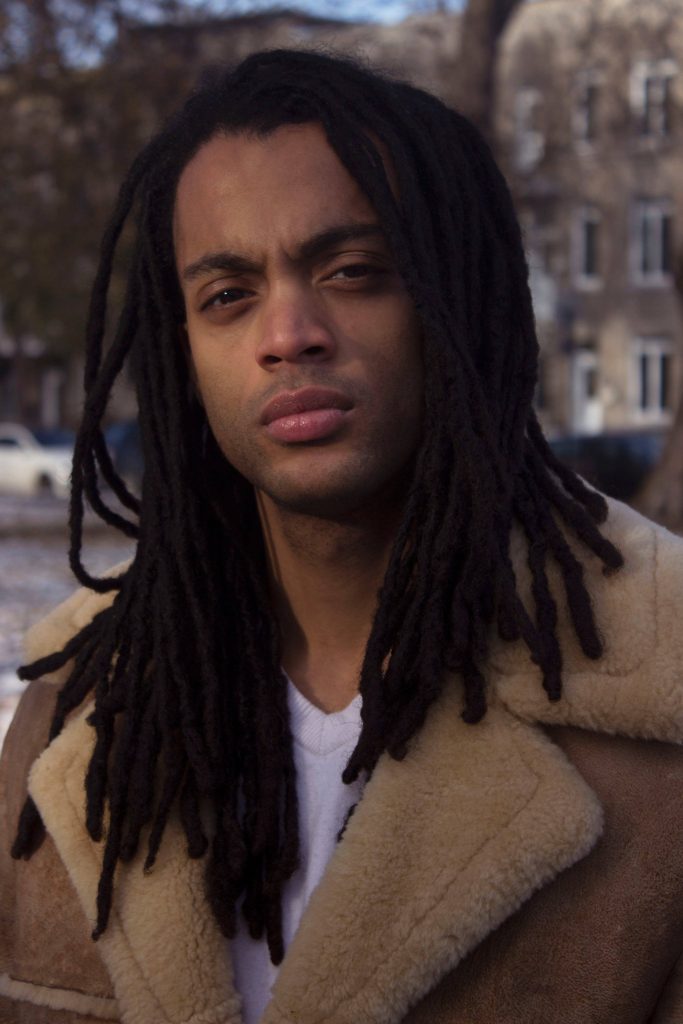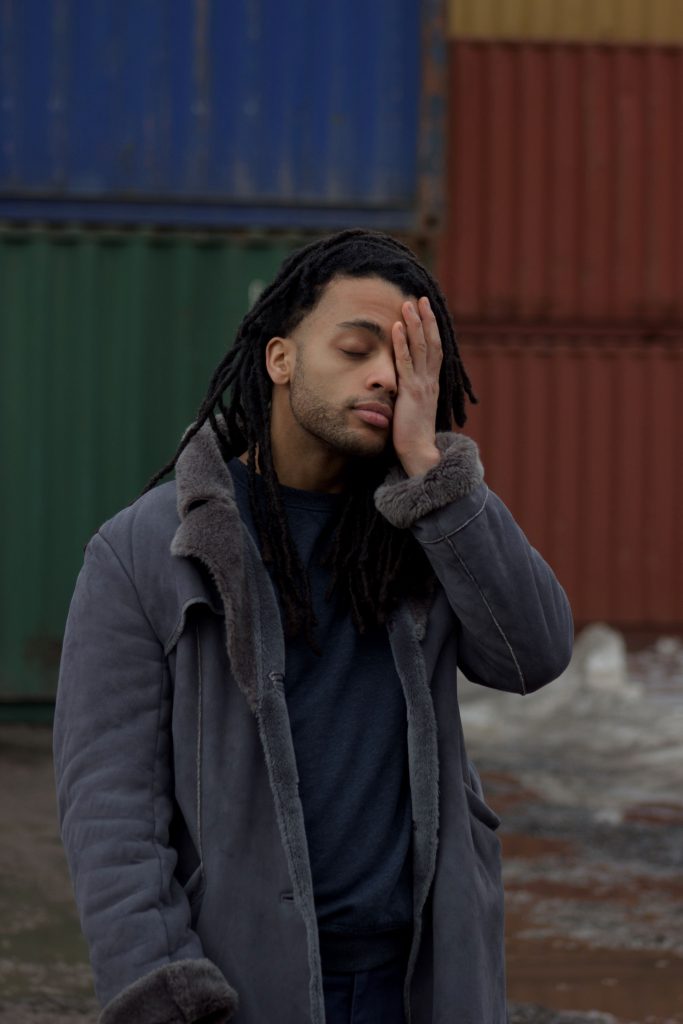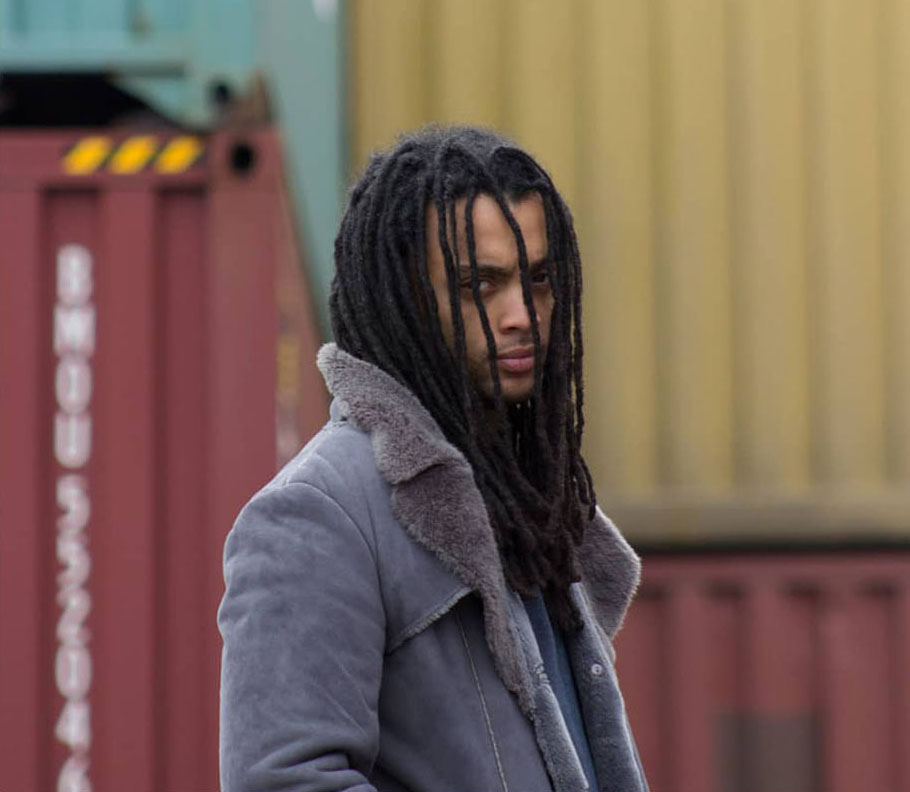Jaymie Silk’s ascension was stupendous. Since his first EP published two years ago, the French producer now based in Montreal has released his work on respected labels (Boukan, [re]souces, Knightwerk, Moonshine…), has played at the best Canadian festivals, is streamed thousands of times each month on Spotify and was also strongly involved in Montreal’s Ballroom scene’s rebirth.
After 10 years involved in Rap and beatmaking, his unique vision about Electronic music, combined with his own history, made Jaymie one of the inevitable actors of a liberated Club music, bold and innovative. Now touring in Europe, we had the opportunity to talk to Jaymie about his career, before having him invited at Plage Club on Saturday, April 9th, in Metz (more infos here).
 Jaymie Silk by Feriel Rahli
Jaymie Silk by Feriel Rahli
CxC | Let’s start at the beginning, how did it all start?
Jaymie Silk | I’ve started by making beats for rappers for 10 years before playing as Jaymie Silk in the club scene through electronic music.
It’s a scene where there are still messages and serious claims, and you can also have fun. A lot of people reunite to create safe spaces in order for everybody to have fun and share the moment, no matter your culture, your origins, your sexual orientation. Rap is more individualist. For instance, I am going to play in Barcelona on April 1st to support street vendors in the city. You will find a lot of people that came from West Africa, Pakistan, who had to move to Europe and who still struggle to survive. This kind of events is quite usual in electronic music. Artistically, what interests me is to make music, create, be an artist. Electronic music has so many sub-genres that you can really allow yourself to try new things. In rap music, you are limited as it is standardized and really conventional. You don’t necessarily have any recognition and you generally have to follow the trend. In electronic music, you can really explore new sound texture. What I have done with Boukan Records with lo-fi sounds, with [re]sources with tribal influences, or by being considered as a producer with a music that I like. Future of music will belong to the one who created the trend, not the one who follows it.
What defines your musical identity today?
I will just say that my music is Jaymie Silk. You can find afro-tribal influences, house/techno, big kick drum, big bass, jerky rhythm and ballroom energy. For example, on “Watch Me” which came out on Knightwerk. And there is a really emo vibe on some tracks, I’m thinking about tracks like Goodbye on “Trouble in paradise” LP, “All I Need” or “Waltz Down” on the Moonshine compilation
“Watch Me”, by Jaymie Silk.
A lot of producers settle down in Europe in order to expand in music, and France has quite an important aura, from the outside, regarding electronic music. You, on the other hand, chose to go to Montreal. Why is that and what did it do to you?
It was mostly to change air and to see other things. Taking a step back can allow you to have a view of the whole picture of what is happening in electronic music. In Europe, including France, we have a really different history with electronic music as what you can listen to in North America, especially regarding bass/club music.
“If I had stayed in Europe, I don’t think I would have had this global vision.” Jaymie Silk
 Jaymie Silk by Feriel Rahli
Jaymie Silk by Feriel Rahli
You are involved in Montreal’s ballroom scene. Could you tell us more about it and your role in it? Are you a member of a house, how did you connect with them?
The first EP I dropped on Bandcamp was a 5 tracks EP called Ballroom and was kind of a tribute to 80s’ ballroom scene with sounds of that time, real house music vibe. When my first LP “Trouble in paradise” was released, my sound had already been heard by a lot of artists, some of them at Qween Beat, which is THE vogue music label (I’m thinking about artists like Byrell and Beek). Ballroom is really active in New York and Toronto, or even Paris now, but there wasn’t anything yet in Montreal. Gerard Reyes aka Bronzé is a Montreal based performer who wanted to launch the vogue scene. Ativan Halen, a DH from Montreal had contacted me as he knows my interest for vogue culture and from that moment on, we’ve been working together with Amazone Wayne in order to create a performing space for every talented individual who wanted to express themselves.
We’ve seen your tracks on Boukan Records, [re]sources which are both French label, or Knightwerk (US) or Moonshine Collective (Montreal). What made you chose those labels to publish your work?
Those last years, in France, we had a renewal of electronic music. Between the apparition of the labels we’ve just talked about, Rinse France’s launch, different new events built around a more multicultural music… What do you think about this phenomenon? Do you feel the same in Canada? Does it match with your music?
It’s an interesting phenomenon: it’s cool to play Afro so everyone wants to play afro. Baile Funk finally arrives in Europe; that makes me smile. This is probably due to the diversity of the actors in the traditional electronic scene.
10 years ago I never imagined mixing behind turntables, it was a particularly white environment in France.
In North America it’s different. Culturally speaking, electronic music, club music is black music. And the problem of identity is greater because of their history.It’s a mix of all those influences. So it’s not rare to have a DJ who plays dancehall, baile funk and kuduro. Before that It was a niche, and with the internet, telephone network in Africa, we have easier access to those genres. I have the feeling that the irony is that we are closer in Europe but we struggle to accept other cultures on a mainstream scale. When raï’n’b was hype, it was made by Arabic people for Arabic people. With afro, black people finally have something that matches with their identity. We, the so-called children of immigrants, are European, we are a lot and we represent a lot of buying power today, and we are creating our own culture. We cannot be ignored anymore.
Fortunately, there are people who are passionate diggers with honest motivation. Take England for instance, there is a real culture of digging outside their comfort zone. It’s not new to see radios such as Radar Radio or Rinse, and curators who are gonna dig an Ethiopian or Indian sound that you’ve never heard of.
I am French, my mother is from Italy and my father is from Benin, and I have spent the last 5 years in Montreal. And I grew up with internet and an unlimited access to music from all around the world. In a way, we create our own culture, it is multi-ethnic and you hear it in my music
You are actually on a European tour, what are your expectations with this “going back home”?
It is mainly a European tour and a way to explore with radio shows and DJ sets. It’s the opportunity to meet people with which I’ve worked over the past two years, and also to see how my music and bass club music is received here, whether it is in Paris, Bruxelles, Barcelone or for Plage Club in Metz. It is going to be different audiences, and it’s always good to go out of your comfort zone
What are your upcoming projects for 2018?
Jaymie Silk will play at Plage Club in Metz on Saturday, April 7th (free), more infos on the event Facebook.
English translation by Manouel Sanchez.
Jaymie Silk SoundCloud Bandcamp Spotify Facebook Instagram

